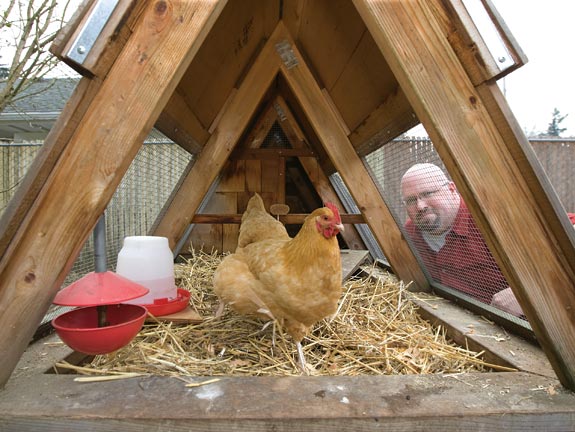There’s an old knee-slapper that goes something like this: Why does a chicken coop have two doors? Because if it had four doors (drumroll, please) it would be a sedan!
“It’s a really lousy joke,” says architect Harley Cowan ‘96, who can’t help chuckling often these days after the “Chicken Sedan” he built for his backyard flock snared two of Portland’s top architectural honors, earning billing alongside designs for major condominium projects, university buildings, and medical facilities.

(Photo Bill Wagner)
Spurred by wife Carrie’s interest in raising chickens and armed with a bit of research, Cowan designed his combination coop and sheltered run with a classic A-frame, cedar-shingled roof that makes it look more like a quaint mountain cottage than a home for fowl. The sedan comes fully equipped with plentiful vents, including several he can open and close to adjust for airflow and temperature. And, yes, it has four doors to gain access to the fowl and their gorgeous bronze-brown eggs.
The “coop de grace,” so to speak, is that Cowan designed his Chicken Sedan to fit exactly atop a standard four-by-eight-foot raised planter bed. His wife suggested using a planter foundation to conserve space on their city lot, but he added a portable twist. Twice a year they rotate the coop among three flower and vegetable beds, depositing chicken manure where the rich fertilizer ultimately needs to go.
“Possibly my favorite thing in the competition,” commented Karrie Jacobs, founding editor-in-chief of Dwell magazine and a member of the jury that selected the Chicken Sedan as the top yard design in Portland Spaces magazine’s annual Root Awards.
“Proving that built design—and opportunities—exist at every scale,” raved the blurb for the People’s Choice Award from the Portland chapter of the American Institute of Architects.
And to think Cowan had to be talked into entering the competitions by co-founders of Yost Grube Hall Architecture, the Portland firm where Cowan has worked since earning bachelor’s degrees in architecture and architectural studies at Washington State University.
“Harley’s like, ‘Are you kidding me? It’s a chicken coop!’” says his brother, Tim Cowan ‘00, also a Yost Grube Hall architect and the one behind his brother’s simple website (ChickenSedan.com). “Harley’s not the type of guy who would toot his own horn about stuff like that.”
Harley Cowan finds it a bit ironic that a project he did on nights and weekends has commanded so much attention. After all, he has helped design offices, homes, and recreation facilities for Chevron employees around the world. Closer to home, as a young architect he was on the team that designed WSU’s Student Recreation Center, and more recently he worked on the new tasting room and cellars at Kiona Vineyards in Benton City, close to where he grew up in Richland.
In sustainable-crazed Portland, where there are more urban chickens per capita than any other American city, the Chicken Sedan is starting to gather a fan base. Website visitors have asked for plans, but Cowan has not created blueprints to distribute.
“I thought it was a pretty fantastic idea,” said Suzette Pump, who brought Cowan in to speak to her new “Raising Urban Chickens” class at Portland Community College. And when Growing Gardens, a Portland organization that promotes family-scale food production, listed the Cowan home as a stop on its Tour de Coops event last summer, people flocked into their backyard by the hundreds. They’ll be on the tour map again July 25.
The Cowans are recent converts to backyard chicken raising, waiting until son Henry was a toddler before bringing three Buff Orpington chicks into the fold two years ago. They chose Orpingtons because they are docile, good layers, and attractive. “That was my idea of what a chicken should look like,” Carrie Cowan says.
They dubbed the hens Dorothy, Blanche, and Rose, after characters from The Golden Girls television show. After a dog killed Dorothy, they acquired Sophia and Bea (after actress Bea Arthur). Their egg cartons, often given away because the birds outpace the family’s egg needs, are stamped “Carrie’s Golden Girls.”
“For me, the coop project was just a fun thing,” he says. “In this profession, we talk a lot about how design doesn’t necessarily have to do with budget or scale. It can happen anywhere.”
